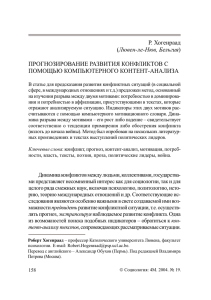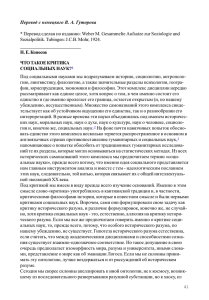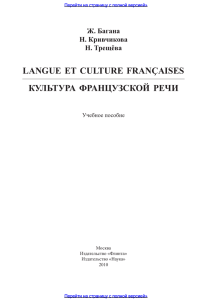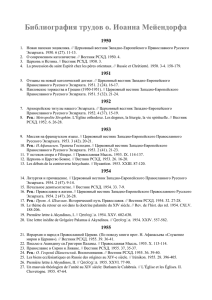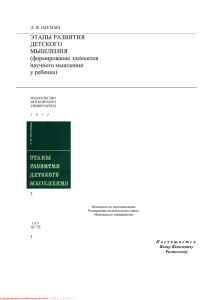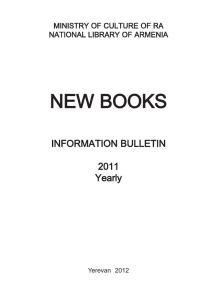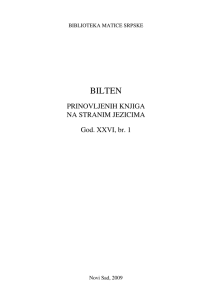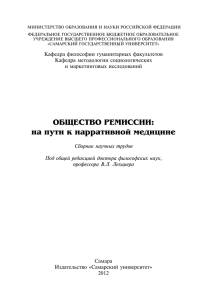литература - Институт психологии РАН
advertisement
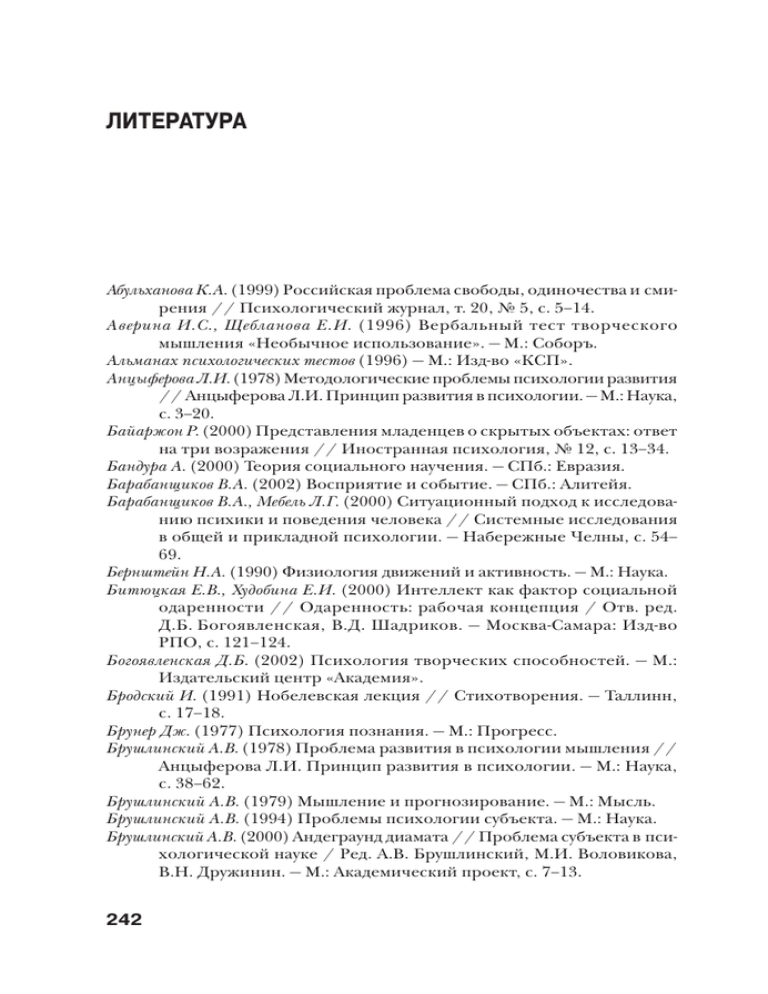
ЛИТЕРАТУРА Абульханова К.А. (1999) Российская проблема свободы, одиночества и сми рения // Психологический журнал, т. 20, № 5, с. 5–14. Аверина И.С., Щебланова Е.И. (1996) Вербальный тест творческого мышления «Необычное использование». — М.: Соборъ. Альманах психологических тестов (1996) — М.: Издво «КСП». Анцыферова Л.И. (1978) Методологические проблемы психологии развития // Анцыферова Л.И. Принцип развития в психологии. — М.: Наука, с. 3–20. Байаржон Р. (2000) Представления младенцев о скрытых объектах: ответ на три возражения // Иностранная психология, № 12, с. 13–34. Бандура А. (2000) Теория социального научения. — СПб.: Евразия. Барабанщиков В.А. (2002) Восприятие и событие. — СПб.: Алитейя. Барабанщиков В.А., Мебель Л.Г. (2000) Ситуационный подход к исследова нию психики и поведения человека // Системные исследования в общей и прикладной психологии. — Набережные Челны, с. 54– 69. Бернштейн Н.А. (1990) Физиология движений и активность. — М.: Наука. Битюцкая Е.В., Худобина Е.И. (2000) Интеллект как фактор социальной одаренности // Одаренность: рабочая концепция / Отв. ред. Д.Б. Богоявленская, В.Д. Шадриков. — МоскваСамара: Издво РПО, с. 121–124. Богоявленская Д.Б. (2002) Психология творческих способностей. — М.: Издательский центр «Академия». Бродский И. (1991) Нобелевская лекция // Стихотворения. — Таллинн, с. 17–18. Брунер Дж. (1977) Психология познания. — М.: Прогресс. Брушлинский А.В. (1978) Проблема развития в психологии мышления // Анцыферова Л.И. Принцип развития в психологии. — М.: Наука, с. 38–62. Брушлинский А.В. (1979) Мышление и прогнозирование. — М.: Мысль. Брушлинский А.В. (1994) Проблемы психологии субъекта. — М.: Наука. Брушлинский А.В. (2000) Андеграунд диамата // Проблема субъекта в пси хологической науке / Ред. А.В. Брушлинский, М.И. Воловикова, В.Н. Дружинин. — М.: Академический проект, с. 7–13. 242 Литература Брюно Ж., Малви Р., Назаре Л., Ушаков Д.В., Пажес Р., Террассье Ж5Ш. (1994) В поисках потерянных талантов // «Акмеология», № 1, с. 101–114. Валлерстейн Р.С. (1996) Исследование процессов и результатов психоана лиза и психоаналитической психотерапии (проект Фонда Меннингера) // Иностранная психология, № 6, с. 44–53. Вебер М. (1990) Избранные произведения. — М.: Прогресс. Винер Н. (1967) Я — математик. — М.: Наука. Воробьева Е.А. (1997) Влияние способа общения на интеллектуальную продуктивность. Дисс. канд. псих. наук. — М.: ИП РАН. Гальперин П.Я., Эльконин Д.Б. (1967) К анализу теории Ж. Пиаже о развитии детского мышления // Дж. Флейвелл. Генетическая психология Жана Пиаже. — М.: Просвещение, с. 596–621. Гарднер Р.А., Гарднер Б.Т. (2000) Обучение шимпанзе жестовому языку в об щении с людьми // Иностранная психология, № 13, с. 18–28. Гнатко Н.М. (1994) Проблема креативности и явление подражания. Канд. дисс. — М.: ИП РАН. Голубева Э.А., Изюмова С.А., Кабардов М.К. (1991) Опыт комплексного исследования учащихся в связи с некоторыми проблемами дифференциации обучения // Вопросы психологии, № 2. Грановский Т.Н. (1987) Лекции по истории средневековья. — М.: Наука. Декарт Р. (1989) Сочинения в 2х томах. Т. 1. — М.: Мысль. Дернер Д. (1997) Логика неудачи. — М.: Смысл. Дружинин В.Н. (1990) Психологическая диагностика способностей: теоретические основы. — Саратов: СГУ. Дружинин В.Н. (1995) Психология общих способностей. — М.: Лантернавита. Дружинин В.Н. (1997) Структура психометрического интеллекта и прогноз индивидуальных достижений // Основные современ ные концепции творчества и одаренности / Ред. Д.Б. Богоявлен ская. — М.: Молодая гвардия, с. 161–185. Дружинин В.Н. (2001) Когнитивные способности: структура, диагностика, развитие. — М.: Пер Сэ, СПб.: ИматонМ. Дункер К. (1965) Психология продуктивного (творческого) мышления // Психология мышления / Ред. А.М. Матюшкин. — М.: Наука. Егорова М.С. (1995) Генетика поведения: психологический аспект. — М.: SocioLogos. Завалишина Д.Н. (1983) Системный анализ мышления // Психологи ческий журнал, № 3, с. 3–11. Завалишина Д.Н. (1985). Психологический анализ оперативного мышле ния. — М.: Наука. Знаков В.В. (1999) Психология понимания правды. — СПб. Знаков В.В. (1999) Классификация психологических признаков истинных и неистинных сообщений в коммуникативных ситуациях. // Психологический журнал, т. 20, № 2, с. 54–64. 243 Интеллект: Структурнодинамическая теория Знаков В.В. (2000) Понимание как проблема человеческого бытия // Психологический журнал, т. 21, № 2, с. 7–15. Иванченко Г.В. (1999) Принцип необходимого разнообразия в культуре и искусстве. — Таганрог, Издво ТРТУ. Калиш И.В. (2000) Федеральная целевая программа «Одаренные дети»: опыт реализации, перспективы // Одаренность: рабочая концеп ция / Отв. ред. Д.Б. Богоявленская, В.Д. Шадриков. — МоскваСа мара, Издво РПО, с. 13–21. Кольридж С.Т. (1987) Избранные труды. — М.: Искусство. Корнилов Ю.К. (1982) Мышление руководителя и методы его изучения. — Ярославль, ЯрГУ. Критская В.П., Мелешко Т.К., Поляков Ю.Ф. (1991) Патология психической деятельности при шизофрении: мотивация, общение, познание. — М.: Издво МГУ. Крогиус А.А. (1981) Вюрцбургская школа экспериментального исследова ния мышления // Хрестоматия по общей психологии. Психо логия мышления / Ред. Ю.Б. Гиппенрейтер, В.В. Петухов. — М.: МГУ, с. 250–254. Курек Н.С. (1997) Педология и психотехника о нравственном, интел лектуальном и физическом уровнях развития населения СССР в двадцатые годы // Психологический журнал, № 3, с. 149–159. Кюльпе О. (1981) Психология мышления // Хрестоматия по общей психологии. Психология мышления / Ред. Ю.Б. Гиппенрейтер, В.В. Петухов. — М.: МГУ, с. 21–27. Лейтес Н.С. (1996) Введение // Психология одаренности детей и под ростков / Ред. Н.С. Лейтес. — М.: Академия, с. 3–8. Лейтес Н.С. (1996) Их трудно воспитывать // Психология одаренности де тей и подростков / Ред. Н.С. Лейтес. — М.: Академия, с. 215–232. Лоарер Э., Юто М. (1997) Когнитивное обучение: история и методы // Когнитивное обучение: современное состояние и перспективы / Ред. Т. Галкина, Э. Лоарер. — М.: Издво «Институт психологии РАН», с. 17–34. Ломброзо Ч. (1992) Гениальность и помешательство. — М.: Лантерна Вита. Ломов Б.Ф. (1984) Методологические и теоретические проблемы психологии. — М.: Наука. Малых С.Б. (ред.) (1995) Генетика поведения: количественный анализ психологических и психофизиологических признаков в онтоге незе. — М.: Socio Logos. Малых С.Б., Егорова М.С., Мешкова Т.А. (1998) Основы психогенетики. — М.: Эпидавр. Манн Т. (1975) Доктор Фаустус. Жизнь немецкого композитора Адриана Леверкюна, рассказанная его другом. — М.: Художественная литература. 244 Литература Марютина Т.М. (1996) Биологическое созревание и психическое развитие // Психология одаренности детей и подростков / Ред. Н.С. Лейтес. — М.: Академия, с. 330–361. Мельников К.С. (1989). Об архитектурном искусстве и своем творчестве / / Константин Месльников. Рисунки и проекты / Ред. Е. Леви тин. — М.: Советский художник, с. 45–56. Митькин А.А. (1999) О роли индивидуального и коллективного сознания в социальной динамике // Психологический журнал, т. 20, № 5, с. 103–112. Обухова Л.Ф. (1981) Концепция Жана Пиаже: за и против. — М.: Просвещение. Паттерсон Ф.Г., Матевиа М.Л., Хайликс В.А. (2000) Как гориллы познают мир вокруг себя: что показал проект Коко // Иностранная психология, № 13, с. 41–55. Перре5Клермон А5Н. (1991) Роль социальных взаимодействий в развитии интеллекта детей. — М.: Просвещение. Петрилл С. (2001) Генетические и средовые связи между общими и специальными когнитивными способностями у престарелых // Иностранная психология, №14, с. 17–23 Пиаже Ж. (1969) Избранные труды. — М.: Просвещение. Пломин Р., Прайс Т.С. (2001) Генетика и когнитивные способности // Иностранная психология, №14, с. 6–16. Поддьяков А.Н. (2000) Исследовательское поведение: стратегии познания, помощь, противодействие, конфликт. — М.: МГУ. Поддьяков А.Н. (2002) Алгоритмическая неразрешимость и ее следствия для организации разумной деятельности // Когнитивная психо логия / Ред. В.Н. Дружинин, Д.В. Ушаков. — М.: ПерСэ, с. 202–204. Политцер Г., Жорж К. (1996) Мышление в контексте // Иностранная психология, № 6, с. 28–33. Пономарев Я.А. (1960) Психология творческого мышления. — М.: Просвещение. Пономарев Я.А. (1976). Психология творчества. — М.: Наука. Попова Л.В. (1996а) Гендерные аспекты самореализации личности. — М.: Прометей. Попова Л.В. (1996а) Проблемы самореализации одаренных женщин. // Вопросы психологии, № 2. Пригожин И. (1985) От существующего к возникающему. Время и слож ность в физических науках. — М.: Наука. Пуанкаре А. (1981) Математическое открытие // Хрестоматия по общей психологии. Психология мышления. — М.: Издво МГУ, с. 356–365. Пушкин В.Н. (1965) Оперативное мышление в больших системах. — МЛ.: Энергия. Рабочая концепция одаренности (1998) М.: ИЧП «Издательство Магистр». 245 Интеллект: Структурнодинамическая теория Равен Дж.К., Курт Дж.Х., Равен Дж. (1996) Руководство к прогрессивным матрицам Равена и словарным шкалам. Разд. 3: Стандартные прогрессивные матрицы. — М.: КогитоЦентр. Равич5Щербо И.В., Марютина Т.М., Григоренко Е.Л. (1999) Психогенетика. — М.: Аспект Пресс. Рамбо Д.М., Биран М. Дж. (2000) Интеллект и языковые способности приматов // Иностранная психология, № 13, с. 29–40. Ротенберг В.С., Бондаренко С.М. (1989) Мозг. Обучение. Здоровье. — М.: Просвещение. Рубинштейн С.Л. (1959) Принципы и пути развития психологии. — М.: Наука. Рубинштейн С.Л. (1989) Основы общей психологии. Т. 2. — М.: Наука. Рубинштейн С.Л. (1958). О мышлении и путях его исследования. — М.: Просвещение. Сергиенко Е.А. (2000) Дискуссия о происхождении знаний // Иностран ная психология, № 12, с. 3–12. Сергиенко Е.А. (2002) Когнитивное развитие // Когнитивная психология / Ред. В.Н. Дружинин, Д.В. Ушаков. — М.: Per Se, с. 347–406. Сергиенко Е.А., Рязанова Т.Б. (1999) Младенческое близнецовое лонгитюдное исследование: специфика психического развития / / Психологический журнал, т. 20, № 2, с. 39–53. Сироткина И.Е. (2000) Гений и безумие: из истории идеи // Психологи ческий журнал, Т. 21, № 1, с. 116–124. Смит Л. (2000) Обладают ли младенцы врожденными структурами знания? Другая сторона вопроса // Иностранная психология, № 12, с. 35–49. Стернберг Р. (1996) Триархическая теория интеллекта // Иностранная психология, № 6, с 54–61. Стернберг Р., Григоренко Е.Л. (1997) Учись думать творчески! // Основные современные концепции творчества и одаренности / Ред. Д.Б. Богоявленская. — М.: Молодая гвардия, 186–213. Субботин В.Е. (2002) Оценочные суждения // Когнитивная психология / Ред. В.Н. Дружинин, Д.В. Ушаков. — М.: Per Se, с. 315–332. Тарле Е.В. (1957) Талейран. — М.: Издво Академии наук СССР. Теплов Б.М. (1961) Проблемы индивидуальных различий. — М.: Педагогика. Тихомиров О.К. (1984) Психология мышления. — М.: Издво МГУ. Ушаков Д.В. (1988а) Гуманитарные и естественнонаучные мотивы в психологии // Методологические и теоретические проблемы современной психологии. — М.: ИПАН. Ушаков Д.В. (1988б) Роль метафоры в творческом мышлении // «Вестник высшей школы», № 1, с. 24–28. Ушаков Д.В. (1995) Проблемы и надежды франкоязычной когнитивной психологии // Иностранная психология, № 5, с. 5–8. 246 Литература Ушаков Д.В. (1998) Одаренность, творчество, интуиция // Современные теории одаренности. / Ред. Д.Б. Богоявленская. — М.: Молодая гвардия. Ушаков Д.В. (1999) Мышление и интеллект // Современная психология / Ред. В.Н. Дружинин. — М.: ИнфраМ, с. 241–266. Флейвелл Дж. (1967) Генетическая психология Жана Пиаже. — М.: Просвещение. Хайликс В.А. (2000) Языковые способности и внутренний мир высших животных. Начало исследований и основные темы // Иностран ная психология, № 13, с. 1–17. Халфорд Г.С. (1997) Высшие когнитивные процессы: знания, построенные на отношениях объектов // Иностранная психология, № 8, с. 44– 51. Хекхаузен Х. (2001) Психология мотивации достижения. — СПб.: Речь. Хеллер К.А., Зиглер А. (1999) Различия между мальчиками и девочками в успеваемости по математике и естественным наукам: может ли переориентация улучшить результаты одаренных школьниц? // Иностранная психология, № 11, с. 30–40. Холодная М.А. (1990) Структурная организация индивидуального интеллекта. Дисс. докт. психол. наук. — М.: МГУ. Холодная М.А. (1997) Психология интеллекта: парадоксы исследования. — Томск, Москва: Издво Том. Унта, Барс. Холодная М.А. (2000) Принципы и методы выявления одаренных детей / / Одаренность: рабочая концепция / Отв. ред. Д.Б. Богоявлен ская, В.Д. Шадриков. — МоскваСамара, Издво РПО, с. 22–28. Холодная М.А. (2002) Интеллект // Когнитивная психология / Ред. В.Н. Дру жинин, Д.В. Ушаков. — М.: Per Se, с. 241–282. Хомская Е.Д., Ефимова И.В., Будыка Е.В., Ениколопова Е.В. (1997) Нейропсихология индивидуальных различий. — М.: РПА. Шадриков В.Д. (1994) Деятельность и способности. — М.: Изд. Корпора ция «Логос». Энгельмейер П.К. (1911) Творческая личность и среда в области техниче ских изобретений. — СПб. Юсупов Ф.М. (1993) Принципы конструирования невербальных тестов способностей. Канд. Дисс. — М.: ИП РАН. Юркевич В.С. (1997) О «наивной» и «культурной» креативности // Основные современные концепции творчества и одаренности / Ред. Д.Б. Богоявленская. — М.: Молодая гвардия, с. 127–142. Яглом И.М. (1983) Почему высшую математику открыли одновременно Нью тон и Лейбниц? // Число и мысль. Вып. 6. — М.: Знание, с. 99–125. Якобсон П.М. (1934) Процесс творческой работы изобретателя. — М.Л. Ямпольский Л.Т. (1984) Измерение продуктивности интеллектуальной деятельности // Вопросы психологии, № 5, с. 142–147. 247 Интеллект: Структурнодинамическая теория Ясперс К. (1999) Стриндберг и Ван Гог. Опыт сравнительного патографи ческого анализа с привлечением случаев Сведенборга и Гельдер лина. — СПб.: Гуманитарное агентство «Академический проект». Acredolo, C., Acredolo, L.P. (1979) Identity, compensation and conservation // Child development, 50, 524–535. Acredolo, C., Acredolo, L.P. (1980) The anticipation of conservation phenomena // Child development, 51, 667–675. Adams, M.J. (1978) Logical competence and transitive inference in young children // Journal of Experimental Child Psychology, 25, 447–489. Akiskal, H.S., Akiskal, K. (1988) Reassessing the prevalence of bipolar disoders: Clinical signification and artistic creativity // Psychiatry and Psychology, 3, 29–39. Albert, D.H. (1999) And the skylark sings with me: Adventures in home schooling and community-based education. — Gabriola Island, BC: New Society Publishers. Anderson, J.R. (1983) The architecture of cognition. — Cambridge Mass., Harvard University. Anderson, M. (1992) Intelligence and development: A cognitive theory. — Oxford: Blackwell. Anderson, M. (2001) Annotation: Conceptions of intelligence // Journal of Child Psychology and Psychiatry, 42, 3, 287–298. Andreasen, N.J.C., Canter, A. (1974) The creative writer: Psychiatric symptoms and family history // Comprehensive Psychiatry, 15, 123–131. Atkinson, J.W., Raphelson, A.C. (1956) Individual differences in motivation and behavior in particular situations // Journal of Personality, 24, 349– 363. Atkinson, J.W., Reitman, W.R. (1956) Performance as a function of motive strength and expectancy of goal attainment // Journal of Abnormal Social Psychology, 53, 361–366. Auzias, M., Casati, I., Cellier, C., Delaye, R., Verleure, F. (1977) Ecrire a 5 ans? — Paris: PUF. Bandura, A. (1977) Self-efficacy: Toward a unifying theory of behavior change // Psychological Review, 84, 191–215. Barnett, L.B., Juhasz, S.E. (2001) The Johns Hopkins Talent Search today // Gifted and talented international, 16, 2, 96–99. Barron, F. (1988) Putting creativity to work // R.J. Sternberg (ed.). The nature of creativity. — Cambridge, Cambridge University Press, 76–98. Baum, S. (1988) An enrichment program for gifted learning disabled students // Gifted Child Quarterly, 32 231–235. Beckman, J., Guthke, J. (1995) Complex problem solving, intelligence and learning abilities // P. Frensch, J. Funke (eds.) Complex problem solving. — Cambridge, Cambridge University Press, 177–200. 248 Литература Bell, C., Roach, P. (1987) Beyond stereotypes: A process for identification of gifted students // Rural Educator, 8, 4–7. Belmont, L., Marolla, F.A. (1973) Birth order, family size, and intelligence // Science, 182, 1096–1101. Benbow, C. (1992) Academic achievement in mathematics and science of students between age 13 and 23: Are there differences among students in the top one percent of mathematical ability? // Journal of Educational Psychology, 84, 51–61. Berry, C. (1981) The Nobel scientists and the origins of scientific achievement // British Journal of Sociology, 32, 381–91. Berry, C. (1990) On the origins of exceptional intellectual and cultural achievement // M.J.A. Howe (ed.) Encouraging the Development of Exceptional Abilities and Talents. — Leicester: the British Psychological Society. Berry, D., Broadbent, D. (1995) Implicit learning in the control of complex systems // P.A. Frensch, J. Funke (eds.) Complex problem solving: The European perspective. — Hillsdale, NJ, Lawrence Erlbaum Associates, 131– 150. Bidell, T.R., Fischer K.W. (1997) Between nature and nurture: The role of human agency in the epigenesis of intelligence // R.J. Sternberg, E. Grigorenko (eds.) Intelligence, heredity, and environment. — Cambridge University Press, 193–242. Bhaskar, R., Simon, H. (1977) Problem solving in semantically rich domains: An example from engineering thermodynamics // Cognitive Science, 1, 193–215. Bless, H. (2000) The interplay of affect and cognition: The mediating role of general knowledge structures // J.P. Forgas (ed.) Feeling and thinking: The role of affect in social cognition. — New York: Cambridge University Press, 201–222. Bloom, B. (1956) Taxonomy of educational objectives: The classification of educational goals. — New York: David McKay. Bloom, B.S. (ed.) (1985) Developing talent in young people. — New-York. Borkowsky, J.G., Peck V.A. (1986) Causes and consequences of metamemory in gifted children // R.J. Sternberg, J.E. Davidson (eds.) Conceptions of giftedness. — Cambridge, Cambridge University Press, 182–200. Botson, C., Deliege, M. (1979) Quelques facteurs intervenant dans la progression des raisonements élémentares // Bulletin de psychologie, 340, 539– 556. Bouchard, T.J. (1983) Do environmental similarities explain the similarity of identical twins reared together? // Intelligence, 7, 175–184. Bouchard, T.J. (1997) IQ similarity in twins reared apart: Findings and responses to critics // Sternberg R.J., Grigorenko, E. (eds.) Intelligence, heredity, and environment. - Cambridge University Press, 126–162. Boysson-Bardies, B. de, O’Regan, K. (1973) What children do in spite of adults’ hypothesis // Nature, 246, 531–554. 249 Интеллект: Структурнодинамическая теория Bradburn, N.M. (1963) N Achievement and father dominance in Turkey // Journal of abnormal social psychology, 66, 413–418. Breland, H.M. (1974) Birth order, family configuration and verbal achievement // Child development, 45, 1011–1019. Brenet, F., Ohlmann, T., Marendaz, C. (1988) Interaction vision/posture lors de la localisation d’une cible enchâssée // Bulletin de psychologie, 388, 22–30. Brody, L.E. (2001) The Talent Search model for meeting the academic needs of gifted and talented students // Gifted and talented international, 16, 2, 99–102. Brody, L., Benbow, C. (1987) Accelerative strategies: How effective are they for the gifted? // Gifted Child Quarterly, 31, 105–109. Bronfenbrenner, U. (1975) Nature with nurture: A reinterpretation of the evidence // A. Montague (ed.) Race and IQ. — New York: Oxford University Press. Brown, A.L. (1973) Conservation of number and continuous quantity in normal, bright and retarded children // Child development, 44, 376–379. Brown, A.L. (1978) Knowing when, where and how to remember: A problem of metacognition // R. Glaser (ed.) Advances in instructional psychology (vol. 1, 77–165). — Hillsdale, NJ: Erlbaum. Brown, A.L., Campione, J.C. (1978) Permissible inferences from cognitive training studies in developmental research // Quarterly Newsletter of the Institute for Comparative Human Behaviour, 2, 46–53. Bruner, J.S. (1966) On the conservation of liquids // J.S. Bruner, R.R. Oliver, P.M. Greenfield et al. (eds.) Studies in cognitive growth. — New York: Wiley. Bryant, P.E., Trabasso, T. (1971) Transitive inference and memory in young children // Nature, 232, 456–458. Buchner, A. (1995) Basic topics and approaches to the study of complex problem solving // P. Frensch, J. Funke (eds.) Complex problem solving: The European perspective. — Hillsdale, NJ, Lawrence Erlbaum Associates, 27– 64. Burt, C. (1966) The genetic determination of differences in intelligence: A study of monozygotic twins reared together and apart // British Journal of Psychology, 57, 137–153. Campbell, J.R. (1996) Early identification of mathematics talent has long-term positive consequences for career contributions // International Journal of Educational Research, 25, 485–496. Carrey, S. (1985) Conceptual change in childhood. — Cambridge, London: MIT Press. Carroll, J.B. (1981) Ability and task difficulty in cognitive psychology // Educational Researcher, 10, 11–21. Case, R. (1985) Intellectual development: birth to adulthood. — New York: Academic Press. 250 Литература Case, R. (1987) Structure and process // International Journal of Psychology, 22, 65–101. Cattaneo, C. (1859) De l’origine des espèces par voie de sélection naturelle, ou les lois de transformation des êtres organisés. — Paris, Flammarion. Cattell, J., Brimhall, D.R. (1921) American men of science. — New York: Science Press. Cattell, R.B. (1941) Some theoretical issues in adult intelligence testing // Psychological Bulletin, 38, 592. Ceci, S.J. (1990) On Intelligence ... More or less: a Bio-ecological Theory of Intellectual Development. — Englewood Cliffs, NJ: Prentice-Hall. Ceci, S.J., Rosenblum, T., de Bruyn, E. & Lee, D. (1997) A bio-ecological model of intellectual development: Moving beyond h2 // R.J. Sternberg, E. Grigorenko (eds.) Intelligence, heredity, and environment. — Cambridge University Press, 126–162. Cicirelli, V.G. (1978) Sibling constellation, creativity, IQ and academic achievement // Child Development, 12, 369–370. Charness, N., Krampe, R., Mayr, U. (1996) The role of practice and coaching in entrepreneurial skill domains: an international comparison of lifespan chess skill acquisition // K.A. Ericsson (ed.) The road to excellence. — New Jersey, 51–80. Cheng, P., Holyoak, K.J. (1985) Pragmatic reasoning schemas // Cognitive psychology, 17, 391–416. Cherny, S.S., Fulker, D.W., Hewitt, J.K. (1997) Cognitive development from infancy to middle childhood // R.J. Sternberg, E. Grigorenko (eds.) Intelligence, heredity, and environment. — Cambridge University Press, 463– 482. Clark, M.S., Isen, A.M. (1982) Towards understanding the relationship between feeling states and social behavior // A.H. Hastorf, A.M. Isen (eds.) Cognitive social psychology. — New York: Elsevier-North Holland, 73–108. Clasen, D., Hanson, M. (1987) Double mentoring: A process for facilitating mentorships for gifted students // Roeper Review, 10, 107–110. Coleman, L. (1985) Schooling the gifted. — Reading, MA: Addision Wesley. Cosmides, L. (1989) The logic of social exchange: Has natural selection shaped how humans reason? Studies with the Wason selection task // Cognition, 31, 187–276. Daurio, S.P. (1979) Educational enrichment versus acceleration: a review of the literature // W.C. George, S.J. Cohn, J.C. Stanley (eds.) Educating the gifted: Acceleration and enrichment. — Baltimore, MD: Johns Hopkins University Press, 13–63. Davidson, J.E., Sternberg, R.J. (1984) The role of insight in intellectual giftedness // Gifted Child Quarterly, 28, 58–64. Davis, D.J., Cahan, S., Bashi, J. (1977) Birth order and intellectual development: the confluence model in the light of cross-cultural evidence // Science, 196, 1470–1472. 251 Интеллект: Структурнодинамическая теория Demetriou, A., Efklides, A. (1987) Experiential structuralism and neo-Piagetian theories: towards an integrated model // International Journal of Psychology, 22, 173–198. Detterman, D.K. (1987) Theoretical notions of intelligence and mental retardation // American Journal of Mental Deficiency, 92, 2–11. Detterman, D.K. (1992) Assessment of basic cognitive abilities in relation to cognitive deficits // American Journal on Mental Retadation, 97, 251–286. Devries, R. (1974) Relationships among Piagetian, IQ and achievement assessment // Child development, 45,746–756. Doise, W. (1987) Idées nouvelles et notions anciennes // J.-L. Beauvois, R.-V. Joule, J.-M. Monteil (eds.). Perspectives cognitives et conduites sociales. 1. Théories implicites et conflits cognitifs. — Suisse, Cousset, Editions Del Val, 229–243. Donnelly, E.F., Murphy, D.L., Goodwin, F.K., Waldman, I.N. (1982) Intellectual function in primary affective disorder // British Journal of Psychiatry, 140, 633–636. Du Don au Talent (1998) Paris: Eurotalent. Dweck, C.S., Bempechat, J. (1983) Children’s theories of intelligence: consequences for learning // S.G. Paris, G.M. Olson, H.W. Stevenson (eds.) Learning and motivation in the classroom. — Hillsdale, NJ, Lawrence Erlbaum Associates, 239–256. Eysenck, H.J. (1971) The IQ argument: Race, intelligence and education. — New York: Library Press. Evans, J.StB.T. (1989) Bias in human reasoning: Causes and consequences. — Hove, UK: Lawrence Erlbaum Ltd. Facon, B., Bollengier, T., Grubar, J.C. (1994) Deficience mentale: influence de la dissociation entre efficience et experience // Enfance, 1, 71–81. Feldman, D.H. (1986) Nature’s Gambit: Child Prodigies and the Development of Human Potential. — New York: Basic Books. Feng, A.X., Campbell, J.R., Verna, M.A. (2001) The talent development of American Phisics Olympians // Gifted and talented international, 16, 2, 108–114. Fiedler, K. (2000) Towards an integrative account of affect and cognition phenomena using the BIAS computer algorithm // J.P. Forgas (ed.) Feeling and thinking: The role of affect in social cognition. — New York: Cambridge University Press. Finkel, D., Pedersen, N.L., McGue, M., McClearn, G.E. (1995) Heritability of cognitive abilities in adult twins: Comparison of Minnesota and Swedish data // Behavior Genetics, 25, 421–432. Fisher, K.W., Farrar, M.J. (1987) Generalization about generalization: how a theory of skill development explains both generality and specificity / / International Journal of Psychology, 22, 137–150. Fischhoff, B. (1991) Judgment and decision making // R.J. Sternberg, E.E., Smith (eds.). The psychology of human thought. — Cambridge University Press, 155–187. 252 Литература Flynn, J.R. (1984) The mean IQ of Americans: Massive gains 1932 to 1978 // Psychological Bulletin, 101, 171–191. Fodor, J. (1983) The modularity of mind. — Cambridge Mass.: MIT Press. Fowler, W., Ogston, K., Roberts, J., Steane, D., Swenson, A. (1983) Potentials of Childhood, Vol. 2: Studies in Early Developmental Learning. — Lexington, Mass.: Heath. Freeman, J. (1976) The Gulbenkian project of gifted children // Gifted children. Looking to their future. — Latimer, London. Freeman, J. (2001) Gifted Children Grown Up. — David Fulton Publishers. London. Frieze, I.H., Weiner, B. (1971) Cue utilization and attribution-all judgments for success and failure // Journal of Personality, 39, 591–605. Fulker, D.W., Cherny, S.S., Cardon Lon, R. (1993) Continuity and change in cognitive development // R. Plomin, G.E. McClearn (eds.) Nature, nurture and psychology. — Washington, DC, APA, 77–97. Fulker, D.W., DeFries, J.C., Plomin, R. (1998) Genetic influence on general mental ability increases between infancy and middle childhood // Nature, 336, 767–769. Funke, J. (1998) Computer-based testing and training with scenarios from complex problem-solving research: Advantages and disadvantages // International Journal for Selection and Assessment, 6, 2, 90–96. Gagne, F. (1985) Giftedness and talent: reexamining a reexamination of the definitions // Gifted Child Quarterly, 29, 103–112. Gagne, F. (1991) Toward a differentiated model of giftedness and talent // N. Colangelo, G.A. Davis (eds.) Handbook of gifted education. — Boston: Allyn & Bakon. Galbraith, R.C. (1983) Individual differences in intelligence: a reappraisal of the confluence model // Intelligence, 7, 185–194. Gardner, H. (1982) Art, Mind and Brain: a Cognitive Approach to Creativity. — New York: Basic Books. Gardner, M.K. (1983) Frames of mind: The theory of multiple intelligences. — London: Heinemann. Gaultney, J.F., Bjorklund, D.F., Goldstein, D. (1996) To be young, gifted and strategic: advantages for memory performance // Journal of experimental child psychology, 61, 43–66. Gear, G. (1978) Effects of training on teachers’ accuracy in the identification of gifted children // Gifted Children Quarterly, 22, 90–97. Geary, D.C., Brown S.C. (1991) Cognitive addition: strategy choice and speed of processing differences in gifted, normal and mathematically disabled children // Developmental psychology, 27, 398–406. Gerrig, R.J. (1991) Text comprehension // R.J. Sternberg, E.E, Smith (eds.). The psychology of human thought. — Cambridge University Press, 242–266. Gesell, A., Thompson, H. (1929) Learning and growth in identical infant twins: an experimental study by the method of co-twin control // Genetic Psychology Monographs, 6, 1–124. 253 Интеллект: Структурнодинамическая теория Glaser, R. (1967) Some implications of previous work on learning and individual differences // R.M. Gagne (ed.) Learning and individual differences. — Merrill, Columbus. Gugliemino, L. (1977) Self-directed learning readiness scale. — Boca Raton, FL: Author. Gunderson, C., Maesch, C., Rees, J. (1987) The gifted-learning disabled student // Gifted Child Quarterly, 31, 158–160. Halford, G.S. (1996) Children’s understanding of the mind: An instance of a general principle? // Contemporary Psychology, 41, 229–230. Hansford, S., Whitemore, J., Kraynack, A., Wingenbach, N. (1987) Intellectually gifted learning disabled students: A special study. — Reston, VA: Council for Exceptional Children-ERIC Clearinghouse on Handicapped and Gifted Children. Harnishfeger, K.K., Bjorklund, D.F. (1994) A developmental perspective on individual differences in inhibition // Learning and individual differences, 6, 331–355. Hayes, J.R. (1981) The Complete Problem Solver. — Philadelphia: the Franklin Institute Press. Higgins, E.T. (2001) Promotion and prevention experiences: Relating emotions to non-emotional motivational states // J.P. Forgas (ed.) The Handbook of Affect and Social Cognition. — Mahwah, NJ: Erlbaum. Hirschfeld, L.A., Gelman, S.A., Eds. (1994) Mapping the mind: Domain specificity in cognition and culture. — New York, Cambridge University Press. Hollinger, C.L., Fleming, E.S. (1992) A longitudinal examination of life choices of gifted and talented young women // Gifted Child Quarterly, 36, 4, 207–212. Holyoak, K.J., Nisbett, R.E. (1991) Induction // R.J. Sternberg, E.E, Smith (eds.) The psychology of human thought. — Cambridge University Press, 50– 91. Horn, J.M. (1988) Thinking about human abilities // J.R. Nesselroade, R.B. Cattell (eds.) Handbook of multivariate psychology. New York: Academic Press. Horn, J.M., Loehlin, J.C., Willerman, L. (1979) Intellectual resemblance among adoptive and biological relatives: the Texas adoption project / / Behavior Genetics, 9, 177–207. Howe, M.J.A. (1992) The Origins of Exceptional Abilities. — Blackwell, Oxford UK, Cambridge USA. Howe, M.J.A. (1996) The childhoods and early lives of geniuses: combining psychological and biographical evidence // K.A. Ericsson (ed.) The road to excellence. — New Jersey, 255–270. Howley, A., Howley, C., Pendarvis, E. (1986) Teaching gifted children: Principles and strategies. — Boston: Little, Brown. Hunt, E.B. (1978) Mechanics of verbal ability // Psychological Review, 85, 109– 130. 254 Литература Hunt, E. (1995) The role of intelligence in modern society // American Scientist, 83 (4), 356–368. Hunt, E. (1997) Nature vs. nurture: The feeling of vuja de // R.J. Sternberg, E. Grigorenko. Intelligence, heredity, and environment. — Cambridge University Press, 531–551. Huteau, M., Loarer, E. (1992) Comment évaluer les méthodes d’éducabilité cognitive? // L’Orientation Scolaire et Professionelle, 21, 47–74. Jacobs, B.S., Moss, H.A. (1976) Birth order and sex of sibling as determinants of mother and infant interaction // Child Development, 47, 315–322. Jamison, K. (1996) Touched with fire. Manic-depressive illness and the artistic temperament. — New York: Simon & Schuster. Jensen, A.R. (1982) Reaction time and psychometric g // H.J. Eysenck (ed.) A model for intelligence. — Berlin: Springer-Verlag, 93–132. Jensen, A.R. (1997) The puzzle of nongenetic variance. // R.J. Sternberg, E. Grigorenko. Intelligence, heredity, and environment. — Cambridge University Press, 42–88. Jensen, A.R. (1998) The g factor. — Westport, CT: Praeger. Jones, H.E., Bayley, N. (1941) The Berkley Growth Study // Child development, 12, 167–173. Johnson-Laird, P. (1983) Mental models: towards the cognitive science of language, inference, and consciousness — Cambridge: Cambridge University Press. Inhelder, B., Sinclaire, H., Bovet, M. (1974) Apprentissage et structures de la connaissance. Paris: PUF. Isen, A.M. (1987) Positive affect, cognitive processes, and social behavior // L. Berkowitz (ed.) Advances in Experimental Social Psychology. New York: Academic Press, 203–253. Kagan, J., Moss, H.A. (1959) Stability and validity of achievement fantasy // Journal of abnormal social psychology, 58, 357–364. Kahneman, D., Tversky, A. (1979) Prospect theory: An analyses of decision making under risk // Econometrica, 47, 263–291. Kallio, K.D. (1982) Developmental change on a five-term transitive inference // Journal of Experimental Child Psychology, 33, 142–163. Kamin, L.J. (1974) The science and politics of IQ. — Potomac, MD: Erlbaum. Karlson, J.L. (1978) Inheritance of creative intelligence. — New York: McGrow-Hill. Keil, F.C. (1988) Concepts, kinds and cognitive development. — Cambridge, London: MIT Press. Kelley H.H. (1967) Attribution theory in social psychology // K. Levine (ed.) Nebraska symposium on motivation. — Linkoln, 193–220. Kerr, B.A. (1985) Smart girls, gifted women. — Columbus, OH: Ohio Psychology Press. Kincaid, D.J. (1971) A story of highly gifted pupils // Educating the Ablest. — Illinois: Peacock Publishers. Knapp, R.H., Goodrich, H.B. (1952) Origins of American Scientists. — Chicago: Chicago University Press. 255 Интеллект: Структурнодинамическая теория Kulik, J.A., Kulik, C.C. (1984) Effects of accelerated instruction on students // Revue of Educational Research, 54, 409–425. Lancer, J., Rim, Y. (1984) Intelligence, family size, and sibling age spacing / / Personality and Individual Differences, 5, 151–157. Lehman, H.C. (1953) Age and achievement. — Princeton, NJ: Princeton University Press. Lewis, M., Kreitzberg, V.S. (1979) Effect of birth order and spacing on mother-infant interaction // Merrill-Palmer Quarterly, 15, 81–100. Lewontin, R.C. (1982) Human diversity. — New York: Scientific American Books. Little, A. (1972) A longitudinal study of cognitive development in young children // Child development, 43, 1025–1034. Lautrey, J. (1990) Esquisse d’un modèle pluraliste du développement cognitif // Reuchlin, M., Lautrey, J., Marendaz, C., Ohlmann, T. (eds.). Cognition: l’individuel et l’Universel. Paris: PUF, 185–216. Loarer, E. (1992) L’éducabilité cognitive: repère historiques et enjeux actuels // L’Orientation Scolaire et Professionelle, 21, 3–11. Loarer, E., Chartier, D., Huteau, M., Lautrey, J. (1995) Peut-on éduquer l’intelligence? L’évaluation des effets d’une méthode de remédiation cognitive. — Berne: Peter Lang. Ludwig, A.M. (1992) Creative achievement and psychopathology: Comparison among professions // American Journal of Psychotherapy, 46, 330–356. Maker, C.J. (1996) Identification of gifted minority students: A national problem, needed changes and promising solution // Gifted Child Quarterly, 40, 41–50. Marendaz, C. (1989) Selection of the reference frame and the «vicariance» of perceptual system // Perception, 18, 739–751. Markman, E.M. (1978) Empirical versus logical solutions to part-whole comparison problems concerning classes and collections // Child development, 49, 168–179. Marland, S. (1972) Education of the gifted and talented: Report to Congress. — Washington, DC: U.S. Office of Education. McCarthy, D. (1972) McCarthy Scales of Children Abilities. — San Antonio, Tex.: Psychological Corporation. McClearn, G.E., Johansson, B., Berg, S., Pedersen, N.L., Ahern, F., Petrill, S.A., Plomin, R. (1997) Substantial genetic influence on cognitive abilities in twins 80+ years old // Science, 276, 1560–1563. McClelland, D.C. (1961) The achieving society. — Princeton, NJ: Van Nostrand. McClelland, D.C. (1964) The United States and Germany: A comparative study of national character // D.C. McClelland (ed.) Roots of consciousness. — Princeton, NJ: Van Nostrand, 62–92. McClelland, D.C., Baldwin, A.L., Bronfenbrenner, U., Strodtbeck, F.L. (1958) Talent and society. — Princeton, NJ: Van Nostrand. McGraw, M. (1935) Growth: a study of Johnny and Jimmy. — New-York: AppletonCentury-Crofts. 256 Литература McGue, M., Bouchard, T.J., Iacono, W.G., Lykken, D.T. (1993) Behavioral genetics of cognitive ability: A life-span perspective // R. Plomin, G.E. McClearn (eds.) Nature, nurture and psychology. — Washington, DC, APA, 59–76. Meeker, M. (1969) The structure of intellect: Its interpretation and uses. — Columbus, OH: Charles E. Merrill. Meeker, M., Meeker, R. (1969) SOI learning abilities test (rev. ed.) — El Segundo, CA: SOI Institute. Mill, J.S. (1971) Autobiography. — London: Oxford University Press. Mimo, M., Cantor, J.H., Riley, C.A. (1983) The development of representation skills in transitive reasoning based on relations of equality and inequality // Child Development, 54, 1457–1469. Moffitt, T.E., Caspi, A., Harkness, A.R., Silva, P.A. (1993) The natural history of changes in intellectual performance: Who changes? How much? Is it meaningful? // Journal of Abnormal Psychology, 90, 152–156. Moles, A. (1968) Information theory and esthetic perception. — Urbana: University of Illinois Press. Monteil, J.-M. (1987) Eléments pour une exploration des dimensions du conflit socio-cognitif: une expérimentation chez l’adulte // J.-L. Beauvois, R.-V. Joule, J.-M. Monteil (eds.). Perspectives cognitives et conduites sociales. 1. Théories implicites et conflits cognitifs. Suisse, Cousset, Editions Del Val, 499–518. Neisser, U. (1982) Memory observed. — New York: Freeman. Nguyen-Xuan, A. (1988) Apprentissage par l’action d’un domaine de connaissance et apprentissage par l’action du fonctionnement d’un dispositif de commande // J.-M. Hoc, P. Mendelsohn (eds.) Les language informatiques dans l’enseignement. Nuttall, R.L. (1964) Some correlates of high need for achievement among urban northern Negroes // Journal of Abnormal Social Psychology, 68, 593–600. Ohlmann, T. (1995) Processus vicariants et théorie neutraliste de l’évolution: une nécessaire convergence // J. Lautrey (ed.). Universel et Différentiel en Psychologie. — Paris: PUF. Page, E.B., Grandon, G.M. (1979) Family configuration and mental ability: two theories contrasted with U.S. data // American Educational Research Journal, 16, 257–272. Pagès, R. (1986) Navette d’échelles en sociopsychologie politique // Bulletin de psychologie, 15, 379, 233–250. Pagès, R. (1987) L’intelligence entre le confit et l’aménité: à propos du conflit sociocognitif // J.-L. Beauvois, R.-V. Joule, J.-M. Monteil (eds.) Perspectives cognitives et conduites sociales. 1. Théories implicites et conflits cognitifs. — Suisse, Cousset, Editions Del Val, 249–284. 257 Интеллект: Структурнодинамическая теория Pagès, R. (1993) La société humaine n’étant pas une termitière vit de psychodiversité dans la biodiversité // Communication au 2-e congrès international d’Eurotalent. Milan-Vercelli. Pagès, R., Derghal M. (1984) Reduire ou faciliter l’expression de l’idiosyncrasie individuelle: concepts et esquisse experimentale // Bulletin de Psychologie, 37, ¹ 11–14, 695–711. Pasqual-Leone, J. (1987) Organismic processes for neo-Piagetian theories: a dialectical causal account of cognitive development // International Journal of Psychology, 22, 25–64. Pedersen, N.L., Plomin, R., McClearn, G.E. (1994) Is there G beyond g (is there genetic influence on specific cognitive abilities independent of genetic influences on general cognitive ability?) // Intelligence, 18, 133–143. Pegnato, C., Birch, J. (1959) Locating gifted children in junior high school / / Exceptional children, 25 (7), 300–304. Perner, J. (1991) Understanding the representational mind. — Cambridge, London: MIT Press. Perner, J., Steiner, G., Staehelin, C. (1981) Mental representation of length and weight series and transitive inferences in young children // Journal of Experimental Child Psychology, 31, 177–182. Piaget, J.(1967) Cognitions and conservations: two views // Contemporary Psychology, 12, 532–533. Piaget, J. (1968) Quantification, conservation and nativism // Science, 162, 976–979. Piaget, J., Inhelder, B. (1947) La representation de l’espace chez l’enfant. — Neuchatel, Delachau, Niestle. Planche, P. (1985) Modalites fonctionnelles et conduites de resolution de problèmes chez l’enfant de cinq, six et sept ans d’age chronologique // Archives de psychologie, 53, 207, 411–415. Planche, P. (1996) Precocite intellectuelle: fonctionnement cognitif et dysharmonie. // Actes du XXVIe congrès de psychologie a Montreal. International journal of psychology, 31, 371. Planche, P. (1998) La construction des notions spatiales chez les enfants intellectuellement precoces, ages de 6 a 8 ans // Enfance, 2, 159–171. Planche, P. (1999) Les strategies de decentration spatio-cognitive chez les enfants intellectuellement precoces de 6 ans // Bulletin de psychologie, 52 (4), 473–480. Plomin, R. (1986) Development, genetics and psychology. — Lawrence Erlbaum Ass. Plomin, R., DeFries, J.C. (1985) A parent-offspring adoption study of cognitive abilities in early childhood // Intelligence, 9, 341–356. Politzer, G., Nguyen-Xuan, A. (1992) Reasoning about conditional promises and warnings: Darwinian algorithms, mental models, relevance judgements or pragmatic schemas? // Quarterly Journal of Experimental Psychology, 44 (3), 401–421. 258 Литература Pollins, L.D. (1983) The effects of acceleration on the social and emotional development of gifted students // C.P. Benbow, J.C. Stanley (Eds.) Academic precocity. — Baltimore, MD: Johns Hopkins University Press, 160–178. Posner, M.I., Mitchell, R.F. (1967) Chronometric analyses of classification // Psychological Review, 74, 392–409. Price, D. (1963) Little science, big science. New York: Columbia University Press. Raven, J. (1991) A model of competence, motivation and behavior and a paradigm for assessment // H. Berlak (ed.) Assessing academic achievement: issues and problems. Reuchlin, M. (1978) Processus vicariants et différences individuelles // Journal de psychologie, 2, 133–145. Record, R.G., McKeown, T., Edwards, J.H. (1969) The relation of measured intelligence to birth order and maternal age // Annals of Human Genetics, 33, 61–69. Renzully, J.S., Reis, S.M. (1997) The Schoolwide Enrichment Model. A how-to guide for educational excellence. — Connecticut: Creative Learning Press, Inc. Retherford, R.D., Sewell, W.H. (1991) Birth order and intelligence: Further tests of the confluence model // American Sociological Review, 56, 141–158. Riley, C.A., Trabasso, T. (1974) Comparative logical structures and encoding in a transitive inference task // Journal of Experimental Child Psychology, 17, 187–203. Rips, L. (1991) Deduction // R.J. Sternberg, E.E. Smith (eds.) The psychology of human thought. - Cambridge: Cambridge University Press, 116–153. Rivero, L. (2002) Creative home schooling for gifted children: A resource guide. — Scottsdale, AZ: Great Potential Press. Roberts, J., Engel, A. (1974) Family background, early development, and the intelligence of children 6–11 years. — US Department of Health, Education and Welfare. Roe, A. (1952) The making of a scientist. — New York: Dodd, Mead. Roe, A. (1953) A psychological study of eminent psychologists and anthropologists, and a comparison with biological and physical scientists // Psychological Monographs: General and Applied, 67. Rogers, K.B. (1986) Do the gifted think and learn differently? A review of recent research and its implications for instruction // Journal of Education for Gifted, 10, 17–39. Rosen, B.C., d’Andrade, R. (1959) The psychological origin of achievement motivation // Sociometry, 22, 185–218. Rosenthal, R.R., Jacobson, L. (1968) Pygmalion in the Classroom. — New York, Holt, Rinehart and Winston. Ryan, D.E., Lakie, W.L. (1965) Competitive and noncompetitive performance in relation to achievement motive and manifest anxiety // Journal of Personal Social Psychology, 1, 342–345. 259 Интеллект: Структурнодинамическая теория Sapp, G.L., Chissom, B. (1985) Factor analysis of the WISC-R for gifted students. Psychological Reports, 57, 947–951. Scarr, S., Carter-Saltzman, L. (1982) Genetics and intelligence // R.J. Sternberg (ed.) Handbook of human intelligence. — Cambridge, England: Cambridge University Press. Scarr, S., Weinberg, R.A. (1977) The Minnesota adoption studies: genetic differences and malleability // Child development, 54, 260–268. Schacter, S. (1963) Birth order, eminence and higher education // American Sociological Review, 28, 757–768. Schank, R.C. (1986) Active memory. — New York: Cambridge University Press. Schuldberg, D. (1990) Schizotypal and hypomanic traits, creativity, and psychological health // Creativity Research Journal, 3, 218–230. Schustack, M.W. (1991) Thinking about causality // R.J. Sternberg, E.E, Smith (eds.). The psychology of human thought. — Cambridge University Press, 92–115. Schwarz, N. (1990) Feelings as information: Informational and motivational functions of affective states // E.T. Higgins, R. Sorrentino (eds.) Handbook of Motivation and Cognition: Foundations of Social Behavior. — New York: Guilford Press, 2, 527–561. Seligman, M.E.P., Hager, J.L. (1972) Biological boundaries of learning. — New York: Appleton-Century-Crofts. Shayer, M. (1987) Neo-Piagetian theories and educational practice // International Journal of Psychology, 22, 245–264. Shore, B.M., Delcourt, M.A.B. (1996) Effective curricular and program practices in gifted education and the interface with general education // Journal of Education for Gifted, 20, 138–154. Siegler, R. (1984) Mechanisms of cognitive growth: Variation and selection // R.J. Sternberg (Ed.) Mechanisms of cognitive development. 141–162. Siegler, R. (1986) Children thinking. — Englewood Cliffs, NJ: Prentice-Hall. Silverstein, A.B. (1982) Factor structure of the Wechsler Adult Intelligence Scale – Revised // Journal of Consulting and Clinical Psychology, 50 (5), 661–664. Simon, H. (1987) Making management decisions: the role of intuition and emotion // Academy of management executive. Simonton, D.K. (1984) Creative productivity and age: A mathematical model based on a two-step cognitive process // Developmental Review, 4, 77– 111. Simonton, D.K. (1988) Creativity, leadership, and chance // R.J. Sternberg (ed.). The nature of creativity. — Cambridge University Press, 386–426. Skeels, H.M. (1966) Adult status of children with contrasting early life experiences: a follow-up study. — Society for research in child development. Southern, W.T., Jones, E.D. (1991) Academic acceleration: background and issues // W.T. Southern, E.D. Jones (eds.) The academic acceleration of gifted children. — New York: Teachers College Press, 1–29. 260 Литература Southern, W.T., Jones, E.D., Stanley, J.C. (1993) Acceleration and enrichment: the context and development of program options // K.A. Heller, F.J. Monks, A.H. Passow (eds.) International handbook of research and development of giftedness and talent. — Oxford: Pergamon, 387–409. Spelke, E.S. (1994) Initial knowledge: Six suggestions // Cognition, 50, 431–445. Stanley, J.C., Benbow, C.P. (1986) Youths who reason exceptionally well mathematically // R.J. Sternberg, J.E. Davidson (eds.). Conceptions of giftedness. — New York, Cambridge University Press, 362–387. Stanley, J.C., Brody, L.E. (2001) History and philosophy of the Talent Search model // Gifted and talented international, 16, 2, 94–96. Sternberg, R.J., Davidson, J.E. (1982) The mind of the puzzler // Psychology Today, 16, 37–44. Sternberg, R.J., Gardner, M.K. (1982) A componential interpretation of the general factor in human intelligence // H.J. Eysenck (ed.). A model for intelligence. — Berlin: Springer-Verlag, 231–254. Stone, K.M. (2002) A cross-cultural comparison of the perceived traits of gifted behavior // Gifted and Talented International, 17, 2, 61–75. Storfer, M.D. (1990) Intelligence and giftedness: the contribution of heredity and early environment. — Jossey-Bass Publishers: San Francisco, Oxford. Subotnik, R.F., Steiner, C.L. (1995) Adult manifestation of adolescent talent for science: A longitudinal study of 1983 Westinghouse science talent search winners // R.F. Subotnik, K.D. Arnold (eds.) Beyond Terman: Contemporary longitudinal study of giftedness and talent. — Norwood, NJ: Ablex, 52–76. Taylor, H.F. (1980) The IQ game: a methodologic inquiry into the heredity-environment controversy. — New Brunswick, NJ: Rutgers University Press. Taylor, R.L., Sternberg, L. (1989) Exceptional children: integrating research and teaching. New York: Springer-Verlag. Terrassier, J.-Ch. (1999) Les enfants surdoués ou «la précocité embarrassante». — Paris, ESF. Tooby, J., Cosmides, L. (1989) Evolutionary psychology and the generation of culture: 1. Theoretical considerations // Ethology and Sociobiology, 10 (1– 3), 29–49. Torrance, E.P. (1988) The nature of creativity as manifest in its testing // R.J. Sternberg (ed.). The nature of creativity. — Cambridge, Cambridge University Press, 43–75. Trabasso, T. (1977) The role of memory as a system in making inferences // R.V. Karl, J.W. Hagen (eds.) Perspectives on the development of memory and cognition. — Hillsday, New Jersey: Erlbaum. Trabasso, T., Riley, C.A. (1975) The construction and use of representations involving linear order // R.L. Solso (ed.) Information processing and cognition. — Hillsday, New Jersey: Erlbaum. 261 Интеллект: Структурнодинамическая теория Trabasso, T., Riley, C.A., Wilson, E.G. (1975) The representation of linear order and spatial strategies in reasoning: a developmental study // R.J. Falmagne (ed.) Reasoning: representation and process. New York. Treffinger, D. (1975) Teaching for self-directed learning: A priority for the gifted and talented // Gifted Child Quarterly, 19, 46–59. Van Tassel-Baska, J. (1997) Contributions to gifted education of the Talent Search concept // C.P. Benbow, D. Lubinsky (eds.) Psychometric and social issues concerning intellect and talent. — Baltimore, MD: Johns Hopkins University Press, 160–178. van Dijk, T.A., Kintch, W. (1983) Strategies of discourse comprehension. — New York: Academic Press. Vernon, P.A. (1983) Speed of information processing and general intelligence // Intelligence, 7, 53–70. Vernon, P.A. (1989) The heritability of mesures of speed of information processing // Personality and Individual Differences, 10, 573–576. Veroff, J., Feld, S.C., Gurin, G. (1962) Achievement motivation and religious background // American Sociological Review, 27, 205–217. Vialle, W., Quigley, S. (2002) Does the teacher of the gifted need to be gifted? // Gifted and Talented International, 17, 2, 85–90. Visher, S.S. (1948) Environmental background of leading American scientists // American Sociological Review, 13, 65–72. Wagner, M.E., Schubert, H.J., Schubert, D.S. (1985) Effects of sibling spacing on intelligence, interfamilial relations, psychosocial characteristics, and mental and phisical health // Advances in child development and behavior, 59, 149–206. Wallace, A. (1986) The Prodigy: A Biography of Wiliam James Sidis, the World Greatest Child Prodigy. — London: Macmillan. Wallas, G. (1926) The art of thought. Wallerstein R.S. (1986) Forty-two lifes in treatment. A study of psychoanalysis and psychotherapy. — Guilford, New York. Wason, P.C. (1968) Reasoning about a rule // Quarterly Journal of Experimental Psychology, 20, 273–281. Weiner, B. (1986) An attribution theory of motivation and emotion. — New-York, Springer. Weiss, P., Wertheimer, M., Groesbeck, B. (1959) Achievement motivation, academic aptitudes, and college grades // Educational Psychology Measmt., 19, 663–666. Wellman, H.M. (1992) The child’s theory of mind. — Cambridge, London: MIT Press. Wendt, H.W. (1955) Motivation, effort, and performance // D.C. McClelland (ed.) Studies in motivation. — New York: Appleton, 448–459. Whitehurst, G.J., Falco, F.L., Lonigan, C.J., Fischel, J.E., DeBaryshe, B.D., Valdez-Menchaca, M.C., Caulfield, M. (1988) Accelerating language 262 Литература development through picture book reading // Developmental Psychology, 24, 552–559. Wiener, N. (1953) Ex-prodigy: My Childhood and Youth. — New-York: Simon&Schuster. Williams, W.M., Sternberg, R.J. (1993) Seven lessons for helping children make the most of their abilities // Educational Psychology, 13, 317–331. Wilson, T.D., Linville, P.W. (1982) Improving academic performance of college freshmen: Attribution therapy revisited // Journal of Personality and Social Psychology, 42, 367–376. Wimmer, H., Perner, J. (1983) Beliefs about beliefs: Representation and constraining function of wrong beliefs in young children’s understanding of deception // Cognition, 13, 103–128. Witkin, H.A. (1950) Perception of the upright when the direction of the force acting the body is changed // Journal of Experimental Psychology, 40, 93– 106. Witte, K.H.G. (1975) The Education of Karl Witte. — New-York: Arno Press. Wohlwill, J.F., Lowe, R. (1962) An experimental analysis of the development of the conservation of number // Child Development, 33, 153–167. Wollach, M.A., Kogan, N.A. (1965) A new look at the creativity — intelligence distinction // Journal of Personality, 33, 348–369. Wood, J.V. (1989) Theory and research concerning social comparison of personal attributes // Psychological Bulletin, 106, 231–248. Zajonc, R.B. (1976) Family configuration and intelligence // Science, 192, 227– 236.
